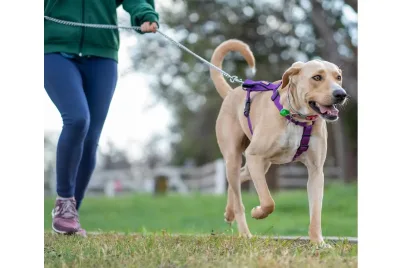Lost Dogs: Prioritizing Pet Identification
Lost dogs are a dog parent’s worst nightmare. That sinking feeling when you realize your furry friend is missing is something we all dread. National Pet ID Week serves as a reminder of the importance of pet identification. It’s not just a week; it’s a movement, urging all pet owners to take proactive steps in safeguarding their pets.
National Pet ID Week begins on April 17th, urging pet owners to prioritize pet identification. Whether microchipping or ensuring visible tags on collars, proper identification can make all the difference in reuniting lost dogs with their families. This week serves as a reminder that it’s never too late to take steps to protect our furry companions.
National Pet ID Week is a vital occasion for dog parents like me. It’s a time when we reflect on the importance of identifying our beloved pets and take steps to keep them safe. In this article, I’ll delve into the significance of this week and provide valuable tips to ensure the safety of our furry companions.
Understanding National Pet ID Week
Every year from April 17th to April 23rd, we observe National Pet ID Week. This week aims to heighten awareness about pet identification. Throughout this period, we urge pet parents to proactively ensure their pets’ identification is readily accessible. It’s a yearly nudge to guarantee that all identification details are accurate, current, and easily understandable. Accurate identification significantly boosts the chances of reuniting lost dogs with their owners.
The Importance of Pet Identification
Losing a pet can be a traumatic experience for both the pet and its owner. Pet identification plays a crucial role in increasing the chances of a lost pet being reunited with its family. Without proper identification, lost dogs face numerous risks, including injury, illness, or even theft.
In 2023, 3.2 million dogs entered animal shelters and rescue organizations, with about 48% or 1,536,000 being strays or lost dogs. As responsible pet parents, keeping our dogs safe is of prime importance.
Even the most obedient dogs may find themselves as lost dogs, due to wandering off unexpectedly, or inadvertently separated from their owners.
Tips for Keeping Your Dog Safe
Equipping your dog with a collar and ID tags is essential. These tags should include your pet’s name, your contact information, and any relevant medical information. Visible identification increases the likelihood of someone finding your lost dog and contacting you promptly.
An additional effective identification safeguard for your dog is microchipping. A microchip is a tiny device implanted under the pet’s skin, containing a unique identification number. In case your dog gets lost, shelters and veterinary clinics can scan the microchip to retrieve your contact information and reunite you with your furry friend.
Historically, collar tags have been widely used and highly recommended for pet identification. Microchips serve as an additional layer of protection, not a replacement for collar tags.
Utilizing Technology for Pet Safety
In today’s digital age, technology offers innovative solutions for pet safety. GPS trackers are one such tool that allows pet owners to monitor their dog’s whereabouts in real-time. These trackers can be attached to the dog’s collar and provide instant alerts if the pet strays beyond a predefined boundary.
Moreover, smartphone apps designed for pet identification and tracking have gained popularity. These apps enable pet owners to store vital information about their pets, including medical records and vaccination history. In the event of a lost dog, having this information readily accessible can expedite the reunification process.
Educating Others about Pet ID
As responsible pet parents, let’s educate others about the importance of pet identification. During National Pet ID Week, take the opportunity to engage with your community and spread awareness about this crucial issue. Encourage fellow pet parents to microchip their pets and ensure their identification is up to date. Please share this article with others to help spread the word about the importance of pet identification.
By promoting responsible pet ownership and sharing valuable resources, we can work together to prevent lost dogs and pets and reduce the number of animals in shelters.
Conclusion
National Pet ID Week serves as a reminder of our duty to protect and care for our furry companions. By prioritizing pet identification and utilizing technology-driven solutions, we can minimize the risks associated with lost dogs and ensure the safety of our beloved pets.
During this week, take a moment to ensure your dog’s tags and collar contain accurate and updated information. Verify that the details are legible and haven’t faded or become illegible over time. If your pet is microchipped, use this opportunity to confirm its functionality and ensure you’re prepared to utilize it if needed. Have you registered the microchip? Keep the brand, the company’s 1-800 number, and your pet’s microchip number easily accessible.
Let’s commit to participating in National Pet ID Week and take proactive steps to keep our furry friends safe and secure.
FAQs:
Q1: What is the purpose of National Pet ID Week?
A: National Pet ID Week aims to raise awareness about the importance of pet identification and reunite lost pets with their families.
Q2: How often should I update my pet’s ID information?
A: It’s recommended to update your pet’s ID information whenever there are changes to your contact details or your pet’s health status. National Pet ID Week is a great reminder to confirm that your pet’s ID information is accurate and correct.
Q3: Can microchips be removed or tampered with?
A: Microchips are designed to be permanent and cannot be easily removed or tampered with once implanted by a veterinarian.
Q4: Are there any risks associated with GPS trackers for dogs?
A: GPS trackers are generally safe for dogs when used according to the manufacturer’s instructions. However, it’s essential to choose a high-quality tracker to minimize any potential risks.
Q5: How can I encourage others to participate in National Pet ID Week?
A: You can encourage others to participate in National Pet ID Week by sharing information on social media, organizing community events, or distributing educational materials about pet identification.




